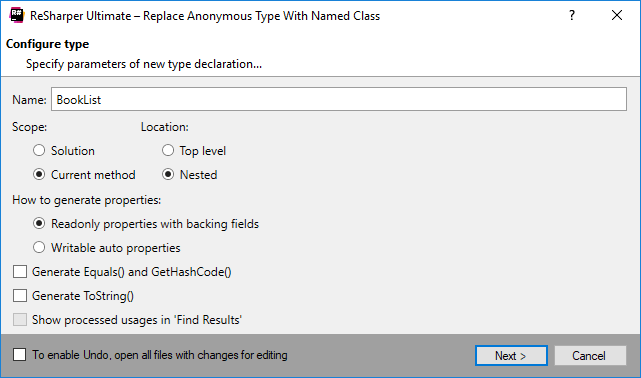Convert Anonymous to Named Type refactoring
Anonymous types are very convenient when you need to process a result of a query locally. However, if you need to pass the result around your program or if there are several queries that return the similar name/value parts, you may probably need a named type.
In such cases, ReSharper can convert the existing usage (or usages) of an anonymous type into a named type and update the usages. If necessary, ReSharper will find and convert similar anonymous types in the whole solution. In the dialog that this refactoring provides, you can customize the created type — specify whether it should have auto-properties or properties with backing fields, or generate equality and formatting method overrides.
In the example below, two similar anonymous types are converted into the BookLIst class, though we only invoke the refactoring on one of them. All usages of the types found within the specified scope are modified accordingly:
Note that this refactoring cannot be applied if the anonymous type initializer has another anonymous initializers inside. For example:
Here you can apply this refactoring to new {book.Title} but not to new {book.Author, title = new {book.Title}}.
Convert anonymous type(s) into a named type
Place the caret at either anonymous type initializer or at the
newkeyword.Do one of the following:
Press Control+Shift+R and then choose Replace Anonymous Type with Named Class.
Right-click and choose Refactor | Replace Anonymous Type with Named Class from the context menu.
Choose from the main menu.
The Replace Anonymous Type with Named Class dialog will open.
Specify a name for a new class, and configure the following options:
Scope: ReSharper can find anonymous types with compatible object initializers (similar name/value parts) in the whole solution, or you can apply the refactoring to the current method only.
Location: the new named type can be created as a nested class in the current type, or created aa an independent class in the current namespace.
How to generate properties: ReSharper can generate either read and write auto-properties, or read-only properties with backing fields in the new class.
How to generate methods: as an option, you can choose to create stubs for
Equals(),GetHashCode(), andToString()method overrides in the new class.Show processed usages in 'Find Results': if this checkbox is selected, ReSharper shows all anonymous types that it finds and converts in the Find Results window. You may want to tick this checkbox if you are converting similar anonymous types in the whole solution.
To apply the refactoring, click Next.
If no conflicts are found, ReSharper performs the refactoring immediately. Otherwise, it prompts you to resolve conflicts.

If you have selected Show processed usages in 'Find Results', the new class and modified usages are shown in the Find Results window:

This feature is supported in the following languages and technologies: